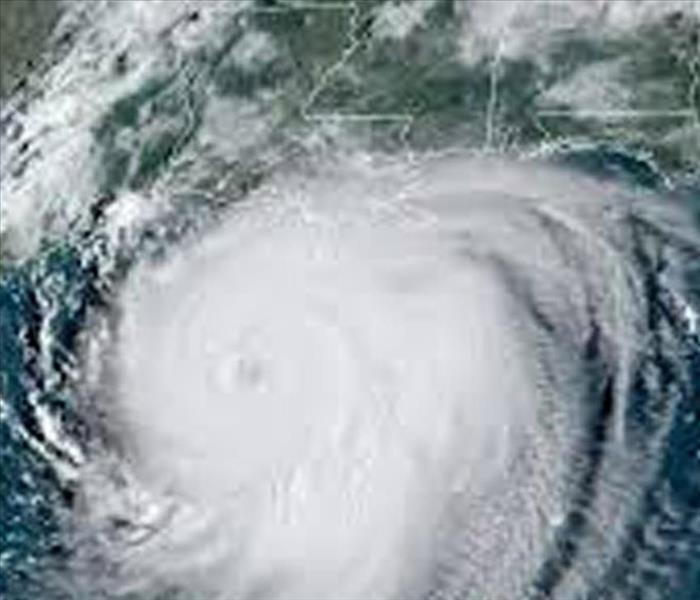Storms increase awareness in Southeastern states
8/27/2020 (Permalink)
 With Hurricane Laura hitting Texas and Louisiana, now's the time to check over your emergency storm checklist.
With Hurricane Laura hitting Texas and Louisiana, now's the time to check over your emergency storm checklist.
Advanced planning in the Gainesville-Alachua County area is key
With Hurricane Laura making landfall in Texas and Louisiana, the summer/fall storm season is ramping up throughout the Southeastern states and we need to be diligent in preparation in the Gainesville and Alachua County area.
The National Oceanic and Atmospheric Administration released a warning earlier in August stating an “extremely active hurricane season possible for Atlantic Basin” and urging preparedness as we enter the peak months.
At SERVPRO of Gainesville West/Alachua County West, we take storm season seriously as we either travel to affected regions or stay in our home area of North-Central Florida to respond to damage resulting from high winds, rain and flooding.
Like any emergency, you want to plan in advance. The State of Florida website offers a comprehensive list for kits, how to secure your home, and dealing with power outages that includes the following:
Hurricane Kits
It is important to create a kit of supplies that you could take with you if you are forced to evacuate. This kit will also be useful if you are able to stay in your home, but are still affected by the storm, such as through the loss of power. One common trend seen when hurricanes are approaching is a wide-spread panic. When this happens, people rush in large numbers to get all the supplies they think they need. However, if you prepare your kit ahead of time, you can alleviate a lot of the potential stress of a very chaotic situation. You should create your kit in a bag that you can easily take with you. Some recommended items to include are:
- Non-perishable food (enough to last at least 3 days)
- Water (enough to last at least 3 days)
- First-aid kit (include any prescription medication you may need)
- Personal hygiene items and sanitation items
- Flashlights (have extra batteries on hand)
- Battery operated radio (again, have extra batteries)
- Waterproof container with cash and important documents
- Manual can opener
- Lighter or matches
- Books, magazines, games for recreation
- Special needs items: pet supplies and baby supplies if applicable
- Cooler and ice packs
- A plan for evacuation and for if family members are separated
Securing Your Home
Know how to secure your home in the event of damaging winds, storm surge and flooding.
- Cover all your windows, either with hurricane shutters or wood.
- Although tape can prevent glass from shattering everywhere, be warned that tape does not prevent the window from breaking.
- If possible, secure straps or clips to securely fasten your roof to the structure of your home.
- Make sure all trees and shrubs are trimmed and clear rain gutters.
- Reinforce your garage doors.
- Bring in all outdoor furniture, garbage cans, decorations, and anything else that is not tied down.
- If winds become strong, stay away from windows and doors and close, secure and brace internal doors.
Power Outages
In the event a storm should leave you without power, there are a few things to consider and help you be ready and stay safe outside of your normal hurricane preparedness.
- Gas: Make sure your tank is full far in advance of an approaching storm. Most people wait until the last minute, rush to get extra gas for cars and generators, and subsequently gas stations can run out early.
- ATMS: Have extra cash on hand in the event no ATMS in your area are accessible or working.
- Cell Phones: Charge your cell phone and limit use after power is out.
- A/C: This can be the most uncomfortable side effect of losing power during a storm. Try to prevent as much light from entering and warming the house by covering up your windows on the inside. If you have back-up or battery-operated fans, don't run them unless you are in the room. Fans create a difference in perceived temperature but do not cool the room; instead, they create a cooling effect by dispersing the heat off your skin. It is said they can actually add heat to a room just by running.
- Water: Fill bathtub and large containers with water for washing and flushing only.
- Food: Turn your fridge temperature down and/or freeze any food or drinking water that can be frozen if you expect a power outage. Here is a guide on freezing food: Freezing and Food Safety. Have a cooler with ice packs prepared to cool your drinks and snacks after power has been out for more than 4 hours.
- Health/Safety: The CDC has a great guide on how to stay safe in the event of a power outage: Power Outages
And if tragedy strikes and your house floods, a tree crashes into your roof and exposes the attic and rooms below to water damage, or a power outage causes your HVAC to go out creating a possible mold situation, call on SERVPRO of Gainesville West/Alachua County West at 352-374-6589. We are open 24 hours a day, 7 days a week to start working on your home or business disaster and make it "Like it never even happened."

 24/7 Emergency Service
24/7 Emergency Service